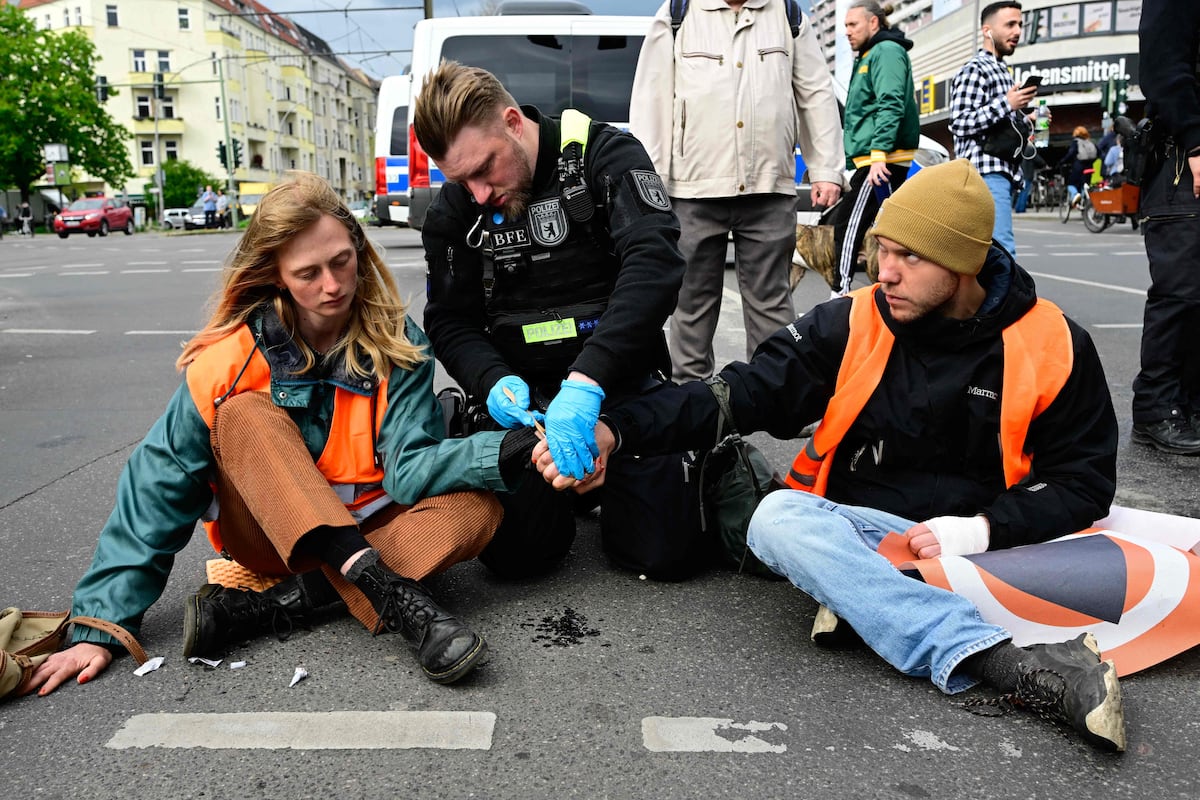A police officer tries to take off the hands of two Letzte Generation activists during a protest action in Berlin on April 25. JOHN MACDOUGALL (AFP)
German police on Wednesday carried out nationwide raids against members of the climate crisis protest group Letzte Generation (Last Generation), accusing them of being part of a criminal organization. Some 170 agents have participated in the searches in 15 properties in seven German states, including Bavaria and Berlin, which have resulted in no arrests.
Letzte Generation activists have staged dozens of protest actions in museums, airports and on the streets of cities such as Berlin in recent months, where they have paralyzed traffic by sticking to the asphalt on entry and exit roads.
According to the Munich general prosecutor's office, the searches were carried out at the request of the Bavarian State Criminal Police Office (LKA), which is preliminarily investigating "numerous criminal complaints received from the public," it said in a statement. The investigation is directed against seven people, members of the group, between 22 and 38 years old, whom the prosecution considers suspected of "forming or supporting a criminal organization".
The seven activists are accused of creating a donation campaign that raised 1.4 million euros to fund the group's future legal battles. They were going to use that money to continue their protests, which range from throwing substances at famous paintings to obstructing rush-hour traffic to draw attention to the climate crisis. Police have also blocked the organization's bank accounts.
The group criticizes the German government's lack of urgent action on the climate emergency. Among their demands is a speed limit of 100 kilometers per hour on German motorways – Germany is the only European country where some sections of motorway have no speed limit – and the creation of a ticket of 9 euros per month to use public transport.
The group's actions have provoked mixed reactions among Germans. Some support and understanding despite the inconvenience they have caused; others of rejection. In some cases, motorists have confronted the activists and violently removed them from the road themselves. Letzte Generation became known in Germany just before the last federal elections, in September 2021, when several of its activists began a hunger strike and camped outside the Bundestag, the German parliament, to demand meetings with deputies.
Police in Bavaria, where a conservative party governs and which will hold elections in October, said in its statement that two of the defendants are also suspected of having tried to sabotage the Trieste-Ingolstadt pipeline in April 2022. One of the searches occurred in the apartment in the neighborhood of Kreuzberg (Berlin) of one of the spokespeople of the organization, Carla Hinrichs, well known in Germany for her appearances on television.
Aimee van Baalen, right, and Marion Fabian, spokespeople for Letzte Generation, during a press conference Wednesday in Berlin. ODD ANDERSEN (AFP)
The activists strongly condemned what they called "repression" against some of their members and announced that they would continue their actions. At a press conference, Aimée van Baalen, the spokeswoman for the activists, called on all citizens to participate in protest marches in different German cities next week. In some, such as Berlin, small rallies took place on Wednesday, hours after the raids. "They scare us, but we must not settle in that fear," he said, encouraging the population to support them.
Police also shut down the group's website, though hours later they acknowledged making a mistake. At first, the page was redirected to a police website with a notice in German and English that said: "Last Generation constitutes a criminal organization according to Article 129 of the Criminal Code! (Attention: Donations to Última Generación therefore constitute illegal support for a criminal organization!)"
To questions from the media, a police spokesman acknowledged that it is only an initial suspicion. Public television consulted a criminal lawyer, Mark Zöller, of the Ludwig-Maximilians-University of Munich, who considered that the wording of that note was "absolutely inadmissible".
Several prosecutors' offices had previously studied the allegations against Letzte Generation, but so far none had considered the group suspected of being a criminal organization. In fact, the Berlin company determined last week, after studying the group's actions, that it is not. Experts doubt that actions such as stopping traffic at rush hour can be criminalized. Thomas Haldenwang, head of the Office for the Protection of the Constitution, Germany's domestic secret services, said in mid-March that he did not consider Letzte Generation to be an extremist group, even if some of its members might commit a crime.
The operation against the activists has already sparked a debate with different legal interpretations on the limits of civil disobedience and there are experts who say that it must be understood in a political context. Social Democrat Interior Minister Nancy Faeser defended the raid: "The red line on the rule of law is very clear: legitimate protest always ends when crimes are committed and the rights of others are violated," she said: "If that red line is crossed, then the police have to act." A few days ago the chancellor, Olaf Scholz, described as "completely crazy" the actions of the group.
You can follow CLIMA Y MEDIO AMBIENTE on Facebook and Twitter, or sign up here to receive our weekly newsletter

